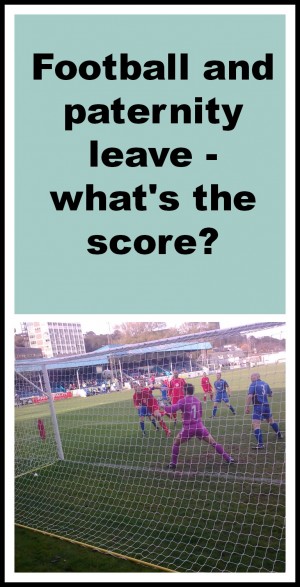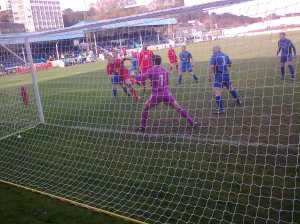 The last twelve months have seen plenty of examples of leading sportsmen taking time off to be present when their partner has been about to give birth. Indeed, last summer the golfer Hunter Mahan withdrew from the Canadian Open whilst in the lead in order to be present at the birth of his first child.
The last twelve months have seen plenty of examples of leading sportsmen taking time off to be present when their partner has been about to give birth. Indeed, last summer the golfer Hunter Mahan withdrew from the Canadian Open whilst in the lead in order to be present at the birth of his first child.
On his blog Fathers, Work and Family, Scott Behson has an entire section devoted to stories about baseball players who have taken advantage of the Major League Baseball (MLB) paternity leave policy. As these stories stories have focused on North American sportsmen, I thought that I’d look at what things are like on the other side of the pond here in the UK and pay particular attention to the sport of football (or ‘soccer’ as some of you may know it).
Over the last few weeks, I’ve thought a lot about attitudes to sportspeople who take paternity leave. Here are five things that stand out for me:
1. The MLB paternity leave policy is doubtlessly significant within an American context but three days of leave really isn’t all that much. It is certainly a start and I’d applaud baseball for taking a lead that I hope that other sports will follow. However, three days really doesn’t sound like a lot of time at all from my perspective as most men here in the UK are entitled to two weeks of paternity leave. As I’ve mentioned on this blog before, I really felt that I benefited from being able to take this fortnight off work to be with my wife and our newborn son. If I’d only been able to take three days off, I’d have been going back to work just as my wife was being let out of hospital.
2. Even though most footballers in the UK are technically entitled to two weeks of paternity leave, has anyone actually taken a fortnight off following the birth of a child? I can’t think of any examples of footballers in the UK who have take two weeks of paternity leave. Indeed, reports of Manchester United’s Wayne Rooney being given time off by his manager following the birth of his son in 2009 generally appeared to ignore the fact that the UK paternity leave system meant that he could have taken two weeks off rather than the few days that his manager supposedly generously granted him. Indeed, this article from The Daily Telegraph suggests that Rooney’s then manager Alex Ferguson had been intending to rest him for the game that took place shortly after his son’s birth anyway.
3. Some managers don’t seem to be particularly supportive of their players’ family life as was shown in 2012 when Paul Caddis was relieved of his role as Swindon captain because his manager Paolo Di Canio reportedly thought that fatherhood has resulted in Caddis becoming less enthusiastic about football. In press interviews at the time, Di Canio didn’t always come across as particularly sympathetic and Caddis appeared angry that the consequences of his son’s birth were evoked publicly by his manager. As a dad, I was shocked to see that Caddis was not treated in a more supportive manner by his club and especially the manner in which his then manager talked about matters that could easily have been treated with a much greater amount of sensitivity.
4. However, thankfully some other managers see things more holistically when it comes to acknowledging the importance of players’ family life. In a recent article in the Observer about the role of computer analysis in football, Everton manager Roberto Martinez stated that “football players are football players once a week” and added that “the rest of the time they are human beings and fathers and husbands – data doesn’t give you that”. In a sport featuring big money and high stakes, it was good to see a high profile manager demonstrating an awareness of the importance of players’ lives away from the playing field.
5. How would fans react to a player taking two weeks of paternity leave at a crucial stage of the season? Despite the fact that some managers are sensitive to the importance of considering their players’ responsibilities as husbands and fathers, I often wonder how they (and fans) would react if a player decided to take paternity leave at a crucial stage of the season that would mean that he would miss several crucial matches. In baseball, the MLB paternity leave policy makes it easier for teams to call up a replacement from within their own ranks. However, I feel that football fans whose team was likely to be without their star player for a big game would probably see a rule that made it easier for them to call upon a lower profile and less experienced replacement as scant consolation.
The highest level of professional sport is clearly a world apart from the lives that most us lead. Although the vast sums of money that leading players earn brings a lot of possibilities for them and their families, the demands placed upon them as professional athletes do not make it easy for them to spend as much time with their families as a lot of the rest of us can. Indeed, it is for this reason that Celtic’s Kris Commons decided to stop playing international football for Scotland after an international away match meant that he was several hundred miles away when his young son was admitted to hospital.
The vast majority of football fans would probably, deep down, admit that their family comes before their favourite team. The tragic death of Billy Sharp’s son Luey at only three days old in 2011 brought tributes from supporters of both the team he played for at the time (Doncaster Rovers) and also opposition fans, as is recounted in this article from The Guardian. Sharp has himself created a foundation in order to raise money to fund research into the birth defect that effected his on and support other families who are affected by it.
Despite the evident sensitivity that exists within professional football in the UK when it comes to certain aspects of parenting, it seems that the sport has a long way to go when it comes to supporting fathers and making it easier for them to take paternity leave. We may have more generous paternity leave entitlements that some countries, but it is not necessarily easy for all men to take advantage of these allowances.
What do you think about the questions to do with paternity leave that I’ve discussed here? Should more be done to allow sportsmen more time off around the time of the birth of a child? Please feel free to share your views in the comments section below or on the ‘Dad’s The Way I Like It’ pages on Facebook or Google+.
Remember that you can also subscribe to this blog by entering your e-mail address in the box on the right of the screen and also follow this blog via BlogLovin. There’s also a Pinterest board for this blog as well, so please feel follow ‘Dad’s the way I like it’ via this method and re-pin your favourite posts.
I’ve linked this post up with the following parent blog linkies (click on the image to see lots of other posts by parent bloggers):














Mar 24, 2014 @ 21:29:06
I found this quite interesting. Your article also reinforced to me how important baseball’s formal system is, considering all the informality and adhoc-ness that surrounds paternity leave.
Mar 24, 2014 @ 21:32:49
Thanks, Scott. Even though baseball’s formal system only gives players a few days off, I reckon that the culture it instills in the game may well result in baseball players taking more time off following their partner giving birth than UK footballers. I think that this is pretty striking given that the vast majority of men who work in the UK are entitled to two weeks of paternity leave by law.
Mar 25, 2014 @ 05:18:08
I always find it fascinating here in Australia too, although I do not know the stats on cricketers and AFL footballers taking leave for the births of their children. I feel they do not take long, but I do silently applaud them for doing the right thing by their families and partners.
I think that sporting careers are fleeting and I do see the need to do as well as you can – while you can – because it won’t last forever.
BUT you can never replace the special time when your child enters the world. Also? You might end your sporting career eventually but you have to be married forever (in theory) haha.
Mar 27, 2014 @ 12:24:34
Hi There,
I really like your blog. I really like your style. 🙂 It’s great to see other like minded dad bloggers. I’m really keen to work with others if you fancy it. Guest posts or promoting each other or anything.
Thanks
http://www.thedadnetwork.co.uk
Mar 28, 2014 @ 17:31:39
Great read! I never even considered how sports teams handle paternity leave for their players. I think taking time to be with your wife and newborn is very crucial for bonding and development along with just being able to support a very emotional new mother. You know what I mean, VERY emotional!
I don’t get too caught up into sports and players’ stats, but can see many fans being upset if an important player took time off during the season. Even more so for the betting fans; they’d be irate!
So, as a new father myself, I say give players the time they deserve to be with their growing family. Damn money and politics always gets in the way though!
Thanks for the excellent write up!
Mar 29, 2014 @ 15:51:50
Thanks. I agree with what you say – I think that a lot of male sports fans will make a difference between what they’d want to do themselves when their partner is going to give birth and the attitude they take to their team’s star player doing likewise.
Mar 29, 2014 @ 16:36:51
What a really interesting article. I think ALL fathers should take paternity leave for the first two weeks. It gives them the opportunity to bond with their child as well as the chance to help the mother get into a routine and help her rest up for while. Great discussion. Thank you for linking to PoCoLo 🙂
Mar 29, 2014 @ 17:25:30
I have always assumed men and women should have equal access to parental leave in any profession. But I can see why that would be complicated in some situations, particularly sports. Thanks for a thoughful read. (Found you through PoCoLo.)